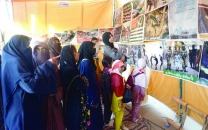Expanding the dragnet
If the operation in interior Sindh is carried efficiently, LEAs are bound to step on the toes of the PPP

Sindh CM Qaim Ali Shah presides over the apex committee meeting at the CM House. PHOTO: NNI
There are also confirmed intelligence reports of activities of outlawed organisations, the Lashkar-e-Jhangvi and the Jaish-e-Mohammad, in Khairpur and Shikarpur districts, areas which are said to have become highly sensitive to militant exploits. In view of all this, it was only logical for the Sindh Apex Committee to decide to extend the scope of the targeted operation against criminals to the entire province of Sindh.
This is a welcome decision as is the one to establish 30 more anti-terrorism courts (ATC) as there are around 10,000 ATC cases pending in Karachi alone. In addition, 200 new public prosecutors, 8,000 policemen and 200 investigation officers are expected to be appointed across the province. The incompetence of the in-service public prosecutors is said be one of the two main reasons why there are so many pending cases in ATCs. The other one is said to be the inadequate number of ATCs. According to the provincial authorities, the 700 public prosecutors appointed by the ‘previous’ government had stayed on even after having been dismissed, by seeking relief from courts. One only hopes that the new prosecutors are not appointed on the basis of their political affiliations as happened in the past, but on merit, so that the new cases in the queue are taken up without much loss of time. Also, the decision of the Apex Committee to deploy heavy contingents of police and Rangers along the Sindh-Balochistan borders to check two-way movements of terrorists is a timely and appropriate move to snuff the menace at its very source.
There is a perception, not entirely incorrect, that the civilian authorities of the province are not doing their part of the job in restoring peace in Karachi with any degree of competence while the Rangers have been performing beyond the call of duty, with increasing powers having been vested in their authority, causing some unease in quarters not entirely comfortable with the military’s increased presence in areas that should ideally form part of the civilian domain. Of course, this over-reliance on security personnel, especially those of the military, to maintain peace and order in Karachi cannot go on forever. It should be noted here that even more than the political government, it is perhaps the failure of the instruments of governance, which include the civil service, the legal fraternity, the judiciary and the police and so on, that have actually created this impression.
Hopefully, the decisions taken by the Apex Committee to reinforce these instruments of governance with competent people selected on merit would help address this perception, as well as the performance on the ground. The governance instruments should be able to immediately act on decisions taken in the past rather than waste time on preparing fresh plans. There is a possibility that if the operation in the interior of Sindh is carried out as efficiently as it was done in Karachi, the law enforcers are bound to step on the toes of the PPP and when that happens one expects the province’s ruling party to respond with the maturity that one expects from a nearly 50-year-old political party.
Published in The Express Tribune, December 6th, 2015.
Like Opinion & Editorial on Facebook, follow @ETOpEd on Twitter to receive all updates on all our daily pieces.



















COMMENTS
Comments are moderated and generally will be posted if they are on-topic and not abusive.
For more information, please see our Comments FAQ